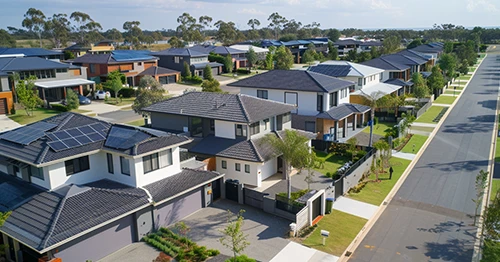Updated: 27 Nov, 2024
The past two years has seen a lot of change in non-resident lending policies and the Australian property market in general.
For foreigners and even Aussies who have been living abroad for a while, it can be overwhelming trying to avoid the traps that overseas borrowers are now faced with.
Here are 7 essential tips that overseas property buyers must know.
Don't buy off the plan
The idea of putting down a deposit on a property before it’s even built sounds a little crazy.
The reason why investors are attracted to buying off the plan is that you can take advantage of any possible increase to the property value by the time you reach settlement.
Of course, that’s a big “if”.
If the valuation drops in that time, you’ll need to quickly come up with a larger deposit or risk defaulting on your building contract.
However, what’s most often overlooked is that it can take up to 24 months for the construction on the unit, duplex or townhouse to be complete.
Two years is a long time when it comes to lending policies, particularly when it comes to foreigners and expats.
So while you may have been approved for your pre-approval, you may not get formal approval at settlement and, again, risk defaulting.
If you’re required to buy a new property by the Foreign Investment Review Board (FIRB), it’s usually better to buy a fully-built property.
Ensure to have a two-week cooling off period at settlement as well.
Beware of auctions
Did you know that there’s no cooling off period if you buy a property at auction?
If you can’t qualify for a mortgage in time or at all, you can’t pull out of the contract and you may lose your deposit.
Borrowing from overseas is very complex so we recommend not taking the chance of locking into a purchase via auction.
Allow more time to get finance
You may need to go to the Australian consulate in your country in order to be legally identified.
Loan documents may be posted back and forth overseas and you may need to provide additional documents.
All this will cause delays with your mortgage application.
That’s why we recommend you negotiate with the seller (vendor) or their real estate agent to extend the settlement date by 2 weeks. If you’re a serious buyer, this should be doable.
The foreigner stamp duty surcharge may not apply to you!
You may have heard in the media that a stamp surcharge applies to all foreigners wanting to buy property in Australia.
This is not necessarily the case depending on the state you’re buying in, your citizenship or visa status and whether you’re in the country at the time of contract exchange/settlement.
The solution is to wait to become a permanent resident or, if you’re buying with a partner, to purchase in the name of the one that holds Australian citizenship.
Other than that, you can simply buy in a state that doesn’t apply the stamp duty surcharge.
We suggest you check out the foreign citizen stamp duty page to find out if the surcharge will apply to you.
Country, currency and visa: it's a real balancing act to get approved!
If you’re buying a property in Australia, then you’re likely either an Australian expat, an Australian permanent resident holder living overseas, a New Zealand citizen living overseas or in NZ or a foreign investor with no Australian visa.
In addition, you may not necessarily be earning in the same currency as the country that you currently reside.
What the banks are now looking for in an overseas borrower is someone who meets the “holy trinity” around country, currency and visa status.
Different rules, requirements and interest rates apply to different overseas borrowers.
For example, some banks prefer certain currencies or won’t accept applicants from certain countries.
Some banks assess your income using Australian tax rates while others use the (usually) lower taxes you’re paying overseas. This can have a huge impact when assessing your income and, ultimately, your borrowing power.
Non-resident lending policies can change so frequently and dramatically that it pays to speak with a specialist mortgage broker with access to many lenders.
Use an expert conveyancer
As a non-resident, you may not be aware of the laws around buying a property in Australia and what your rights are as a purchaser.
A conveyancer or solicitor is involved in the legal process of transferring the ownership of a property to the buyer.
These licensed professionals ensure that you’re legally protected when signing the Contract of Sale and reaching settlement on the property.
Check out this list of conveyancers that we recommend for the state you’re looking to purchase in.
Avoid foreign currency loans
Even though you earn an income in a currency that isn’t Australian dollars, we recommend you avoid foreign current mortgages if you can.
Although the interest rate is usually lower, the big risk is if exchange rates move.
A fall could see you having to provide more security for your mortgage or pay down your loan to a level that the bank finds acceptable.
One of Australia’s major banks, Westpac nearly went under in 1992 because of these loans.
Our mortgage brokers have untangled the mess involved in getting approved for an overseas borrower mortgage.
Call us on 1300 889 743 ( +61 2 9194 1700 if you’re calling from overseas) or complete our online assessment form to find out if you qualify for a loan.





